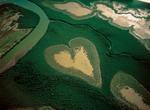
One example of IIIEE´s outreach activities is the distance education course “Introduction to Cleaner Production and Sustainable Development” (ICP). During the past 18 months, some 267 course participants, or change agents, from 52 countries have been registered on this 20-week part-time course qualifying, amongst other things, web-tutors for the IIIEE Young Masters Program (YMP).
The ICP-course is a living example of entirely on-line collaborative learning. These change agents learn to know more about preventive environmental strategies. They learn to live together (in a web-community) by approaching an ill-structured real-world environmental problem on sustainable tourism. They learn to apply their skills in practice by doing an initial environmental review in a small organisation of 5-50 employees, thus contributing to raised environmental awareness in the local community.
Strengthening change makers far away is made possible by a web-pedagogy that facilitates learning to know, to live together and to do. Ample evidence suggests that this strengthens the course participant’s own willingness to learn to be in conjunction with the sustainable development principles, as demonstrated in the ICP-course evaluations:
- Final evaluation (June 6th), 2004
- Final evaluation (January 12th), 2005
- Mid-term evaluation (April 19th), 2005
Read more: Eneroth, C. (2000), e-Learning for Environment, IIIEE Dissertation 2000:8
No comments:
Post a Comment